A few days of the week, an unusual type of movie-goer queues outside of Fuzhong 15 (府中15), a cultural institute in Banciao District (板橋) under the management of the Cultural Affairs Department of New Taipei City Government. Sometimes, they are visually impaired individuals, accompanied by their guide dogs. Sometimes, they are mothers with babies in strollers.
“We want to reach out to a broader range of people, offering public services that are not readily available,” says Hsieh Tsai-miao (謝彩妙), a researcher at the cultural affair bureau’s visual and performing arts division.
Since its inception in 2011, the public institution, outfitted with a movie theater, exhibition rooms and an animation archive, has quickly expanded from its initial focus on documentary cinema and animation to art-house films and special programs tailor-made for those with special needs.
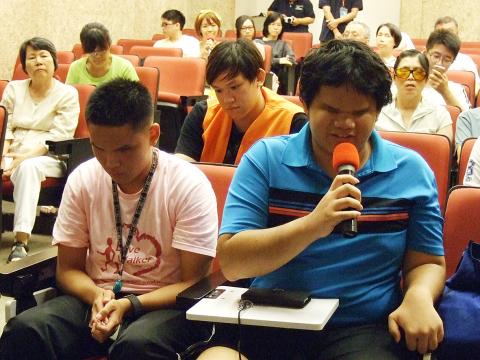
Photo Courtesy of Fuzhong 15
CHILDREN FRIENDLY
The first group of people who sprung into the organizers’ mind was parents with infants or toddlers under the age of three. During the venue’s special hours for baby-friendly showings every Friday afternoon, moms and dads don’t have to worry about getting shushed when their babies cry. Children are free to walk, talk, eat and play with their peers, while their caretakers watch the movie or socialize with others. To create a suitable environment, the volume is kept lower, and lights turned on, though still dim.
Hsieh says that since Taiwanese parents are very protective of their children, the staff has to understand and solve all their concerns such as changing diapers and fixing bottles. For each showing, six to eight volunteers are present to keep an eye on the youngsters.
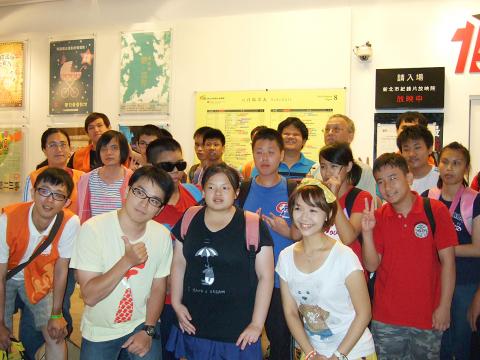
Photo Courtesy of Fuzhong 15
“At the beginning, parents were really confused and kept asking why we didn’t play cartoons. We had to explain to them that the idea is to give parents a chance to sit back, relax and enjoy a good movie,” Hsieh adds.
Meanwhile, every Saturday afternoon, the theater is reserved for the visually impaired. With help from Huang Ying-hsiung (黃英雄), a professional dedicated to promoting cinema designed for the visually impaired, and seasoned voice actor Lin Hsieh-chung (林協忠), the organizers are able to work with a team of voice-over artists who describe scenes and narrate stories to the visually impaired live at the theater during screenings.
“As different artists have different expertise, skills and personalities, each of them is good at narrating a particular type of movie. For example, Huang is the one you need for issue-oriented documentaries…The voice actors are the ‘eyes’ of the visually impaired. The different languages they adopt will change the ways the audience ‘sees’ the movie,” says Ko Hsiu-wen (柯秀雯), a planning specialist at Fuzhong 15.
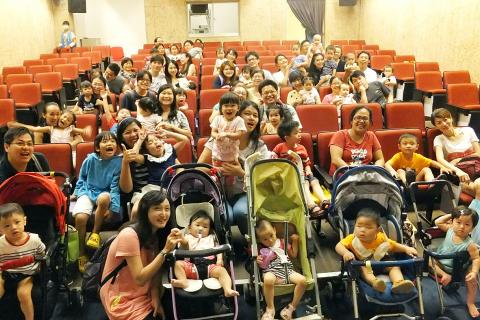
Photo Courtesy of Fuzhong 15
WHAT’S HOT AND WHAT’S NOT
The organizers pay special attention to what is hot and current when selecting films for the visually impaired so that they can have common things to talk about with their friends. Take the featured film of this month’s lineup, Blind Message (推拿), for example. It is a new work by the enfant terrible of Chinese cinema Lou Ye (婁燁) that won several awards at the Golden Horse Awards in November.
Every Tuesday, audiences aged 50 and up are welcome to attend screening events designed as a venue for them to enjoy entertainment, make friends or pick up something new through the films they watch. Movies are something selected because they tell stories about the elderly or featuring veteran stars and icons, such as Paul Newman or late Taiwanese musical sensation Hung Yi-feng (洪一峰), with whom the older audience is family with. Some are chosen because they present and explore new ideas and issues and thus give the older generation a chance to learn about the ever-changing world, Ko says.
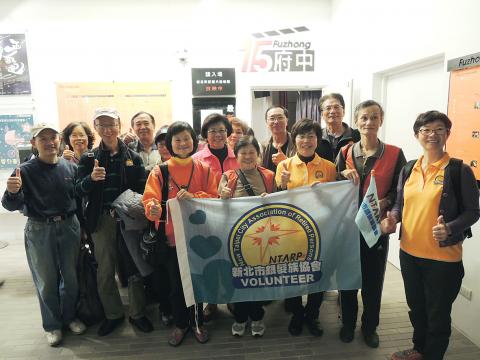
Photo Courtesy of Fuzhong 15
For general audiences, Fuzhong 15 teams up with Cimage Taiwan Film (中映電影) for monthly themed programs featuring art-house films. This month’s motif is travel, and the lineup includes Venice award-winning Sacro GRA, Lost in Translation and Life of Pi.
Starting this month, the organizers put together a new series of programs aimed to explore interesting social and cultural issues through film screenings and lectures. Beltracchi: The Art of Forgery, for example, is a documentary about the life and work of Wolfgang Beltracchi, a master forger tricking the international art world for nearly 40 years. After the screenings, renown auctioneer Jimmy Lu (陸潔民) will hold talks to share his experiences with art auctions and markets.
Ko points out that many of their works are initiated to meet the audiences’ suggestions and responses.
“Lots of innovative ideas actually come from the crowd. We listen, take in interesting ideas and try to realize them with our existing resources,” she says.
All film screenings are free except for the monthly themed programs which cost NT$20 per screening. Those interested are encouraged to register for screenings in advance as seats are limited. The venue also hosts new media art exhibitions, courses and lectures on a regular basis. More information can be found at the institute’s Web site at www.fuzhong15.ntpc.gov.tw.
Fuzhong 15 is located at 15 Fujhong Rd, Banciao Dist, New Taipei City (新北市板橋區府中路15號). It’s a couple of minutes’ walk from the Fuzhong MRT Station (府中捷運站) exit No. 2.

From the last quarter of 2001, research shows that real housing prices nearly tripled (before a 2012 law to enforce housing price registration, researchers tracked a few large real estate firms to estimate housing price behavior). Incomes have not kept pace, though this has not yet led to defaults. Instead, an increasing chunk of household income goes to mortgage payments. This suggests that even if incomes grow, the mortgage squeeze will still make voters feel like their paychecks won’t stretch to cover expenses. The housing price rises in the last two decades are now driving higher rents. The rental market

July 21 to July 27 If the “Taiwan Independence Association” (TIA) incident had happened four years earlier, it probably wouldn’t have caused much of an uproar. But the arrest of four young suspected independence activists in the early hours of May 9, 1991, sparked outrage, with many denouncing it as a return to the White Terror — a time when anyone could be detained for suspected seditious activity. Not only had martial law been lifted in 1987, just days earlier on May 1, the government had abolished the Temporary Provisions Effective During the Period of National Mobilization for Suppression of the Communist
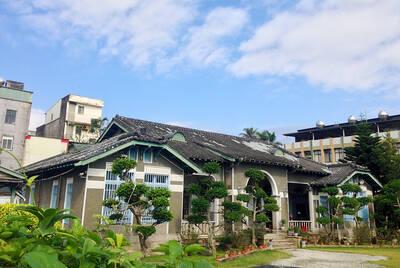
When life gives you trees, make paper. That was one of the first thoughts to cross my mind as I explored what’s now called Chung Hsing Cultural and Creative Park (中興文化創意園區, CHCCP) in Yilan County’s Wujie Township (五結). Northeast Taiwan boasts an abundance of forest resources. Yilan County is home to both Taipingshan National Forest Recreation Area (太平山國家森林遊樂區) — by far the largest reserve of its kind in the country — and Makauy Ecological Park (馬告生態園區, see “Towering trees and a tranquil lake” in the May 13, 2022 edition of this newspaper). So it was inevitable that industrial-scale paper making would

Hualien lawmaker Fu Kun-chi (傅?萁) is the prime target of the recall campaigns. They want to bring him and everything he represents crashing down. This is an existential test for Fu and a critical symbolic test for the campaigners. It is also a crucial test for both the Chinese Nationalist Party (KMT) and a personal one for party Chairman Eric Chu (朱立倫). Why is Fu such a lightning rod? LOCAL LORD At the dawn of the 2020s, Fu, running as an independent candidate, beat incumbent Democratic Progressive Party (DPP) lawmaker Hsiao Bi-khim (蕭美琴) and a KMT candidate to return to the legislature representing